Feb 5, 2019 | Non categorizzato
Do something yourself to heal broken relationships in your city The beating Since the battle against drug trafficking started in Mexico, there have been many victims, not always because of criminal violence. Some time ago, I was on my way home from school when a young guy asked me for a cigarette. Just then, some policemen arrived and they searched us. Then they started beating the other guy and insulting him, leaving him injured and bleeding in the middle of the road. I had witnessed this without being able to do anything, but then I helped him get up and gave him the few coins I had in my pocket. He thanked me and said, ‘This money means my family will have a meal today.’ (Abraham, Mexico) The exchange of letters In our young people’s catechism class, we studied the Works of Mercy. To put them into practice we thought of writing to women in prison. I outlined the project to the Prison Governor who did not agree at first. However, later, when he had consulted other staff, he saw it was a good idea and could help the women. So, the project was approved and the young people got to work preparing drawings and letters to send to the prisoners. (Prisca, Switzerland) Bazar I knew a few poor families and wanted to help them. In the office a colleague asked me if I was interested in some good quality clothing she no longer needed and toys that belonged to her children who were now grown up. I told her about my desire to help the families and she decided to get others involved. Very soon we had gathered so much stuff in a garage that we either gave away or sold at a bazaar. With the proceeds we have been able to help a lot of families in difficulty. After this experience another colleague who is often very grumpy said we couldn’t stop there so we keep looking around to see who else we can help. (R.A.R. – Brazil)
Edited by Chiara Favotti
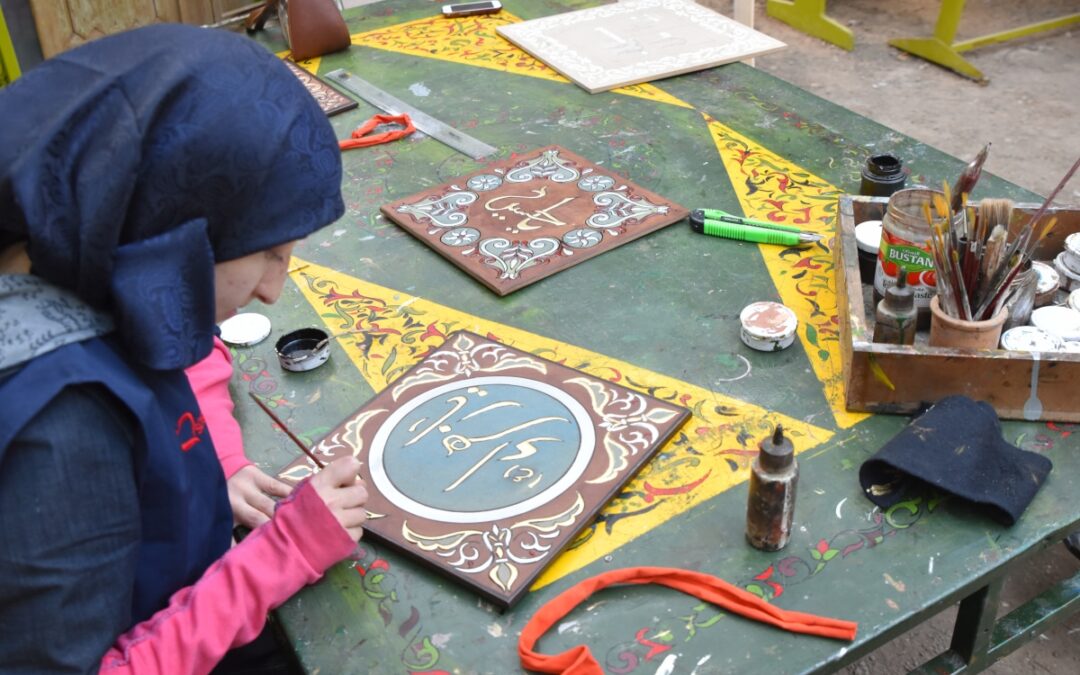
Feb 4, 2019 | Non categorizzato
Many humanitarian projects seek to alleviate the difficulties populations have to face. Since 2012, even the Focolare Movement has been offering its support and assistance through the non-profit organizations AMU and AFN. High currency devaluation, a continuous increase in the cost of living together with a constant decline in public services, are only a few of the problems that mark the social and civil state of affairs in Syria after seven years of war. The effects of this war are becoming more and more unbearable. Those who lost their jobs have been forced to spend all their savings in order to survive and pay for medical care, in a country where doctors, teachers and many other professionals have been constrained to emigrate abroad. But, as reported by those responsible for projects carried out in Syria by the Focolare community, through the non-profit organizations AMU and AFN, “marvellous values such as solidarity, hospitality, generosity and fraternity” flourish in this extremely arduous situation. “God is with us; He sustains us and encourages us”, they affirm. The “Emergency Syria” project supports more than 200 displaced families from Damascus, Homs, Aleppo, Kafarbo and other coastal localities. These are visited regularly by teams of volunteers, who at various moments, such as births, birthdays and particular phases of school life, have never failed to support them, always respecting their sensitivity and dignity. Through this project, families have been helped with payments of school expenses and with buying necessary appliances, food and blankets. But what they appreciate most is the fact that they feel accompanied in this difficult phase of their life. 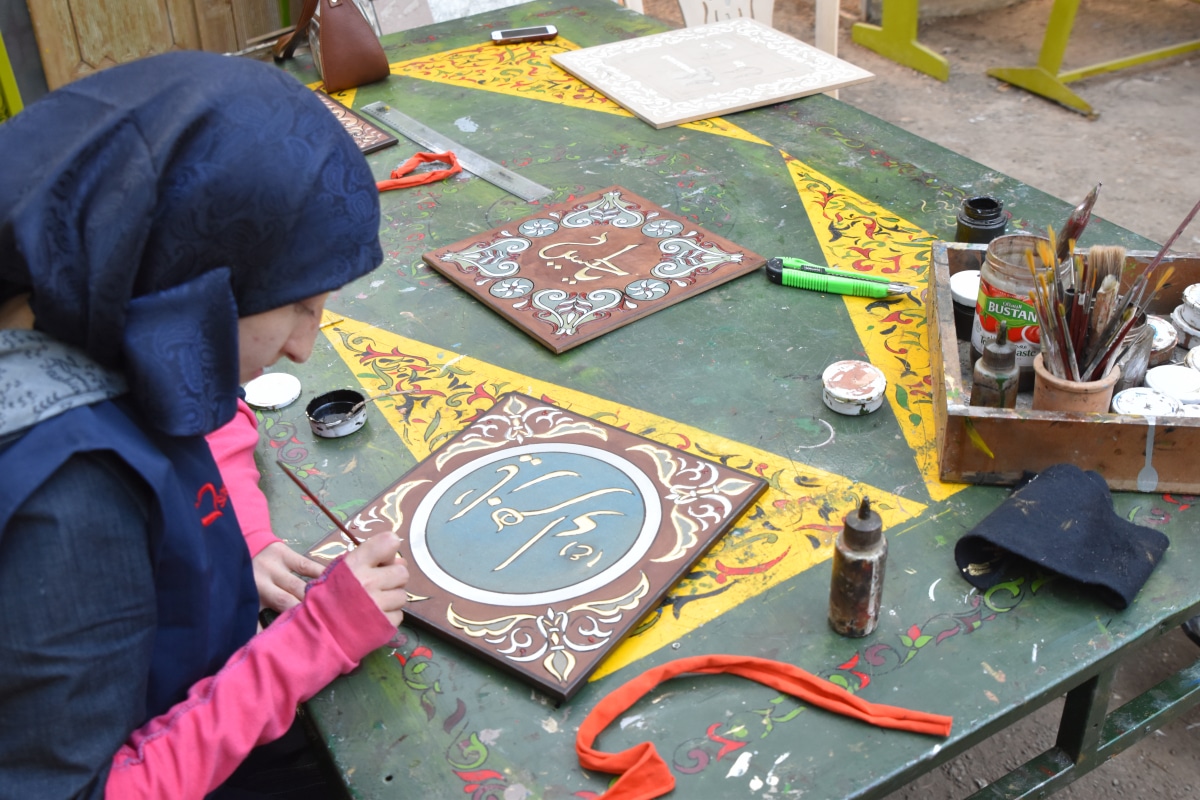 For the last six years activities have been programmed and carried out in the fields of health care, education and family income support; recently other programmes have been added, especially in the field of vocational training and education. “This commitment emerges not only from wanting to meet the urgent material needs of the people supported, but also from wanting to offer work opportunities to many others, especially to young people, who would otherwise be unemployed because of the country’s current situation”. Last year, in Dueilaa, there were more than 90 children who attended after school activities and this gave excellent results. The centre remained open even during the summer months and it could cater for an intake of 115 children. “Some mothers tell us that their children opt to come to the centre even when they are sick or when there is some other family programme”. “A Generation of hope” is the name of another centre located at Homs.The students who attend this centre have successfully passed their school exams. Here, the possibility of psychological support is also offered to both children and parents. “We target mainly the traumas suffered because of war, and this helps to restore confidence and to find solutions for their many problems”. Just over two years ago, at this same place, and also at Kafarbo, a health care project has been set up. More than a hundred people, who needed special medical care, have already benefitted from this project. “We try to collaborate with other organizations to be able to help the patients even when the cost of treatment or surgery exceeds our means”.
For the last six years activities have been programmed and carried out in the fields of health care, education and family income support; recently other programmes have been added, especially in the field of vocational training and education. “This commitment emerges not only from wanting to meet the urgent material needs of the people supported, but also from wanting to offer work opportunities to many others, especially to young people, who would otherwise be unemployed because of the country’s current situation”. Last year, in Dueilaa, there were more than 90 children who attended after school activities and this gave excellent results. The centre remained open even during the summer months and it could cater for an intake of 115 children. “Some mothers tell us that their children opt to come to the centre even when they are sick or when there is some other family programme”. “A Generation of hope” is the name of another centre located at Homs.The students who attend this centre have successfully passed their school exams. Here, the possibility of psychological support is also offered to both children and parents. “We target mainly the traumas suffered because of war, and this helps to restore confidence and to find solutions for their many problems”. Just over two years ago, at this same place, and also at Kafarbo, a health care project has been set up. More than a hundred people, who needed special medical care, have already benefitted from this project. “We try to collaborate with other organizations to be able to help the patients even when the cost of treatment or surgery exceeds our means”.
Chiara Favotti

Feb 4, 2019 | Non categorizzato
70 years after the first Mariapolis was held in Italy’s Dolomites, 2019 sees the Mariapolis returning to its place of origin and inviting participants from all over Europe. We interview Peter Forst, director of the Focolare Movement for Central Europe and one of the organizers of the event. Today’s Europe appears very divided – with Brexit on one side and walls against immigration on the other. What is the point of having a European Mariapolis? It was the realisation of how divided Europe really is that gave birth to the idea of the European Mariapolis. We realised that here in Europe we hold very different opinions, sometimes opposing opinions, about developments in Europe with regard to migration, values, etc. The primary purpose of the Mariapolis is to strengthen relationships, to create spaces for communion and sharing and to encourage all humanity to set out on the pathways of universal fraternity – of unity between individuals and between peoples. So we hope to be able to witness that it is possible to remain united – even if there are many differences between us. How has the Mariapolis changed – from 1949 to 2019? The first Mariapolis was very spontaneous. Today more logistics are involved in the organisation and preparation of the programme. But we want the spirit of this European Mariapolis to be the same as that of 60 or 70 years ago: we want to experience and give witness to the fact that humanity is a family. How do we do it? Unconditional love. Why have it in the Dolomites? The idea of having this Mariapolis in the same place as the first Mariapolis immediately felt right to all of us. Seventy years ago, in the summer of 1949, Chiara Lubich was on holiday with her first companions at Tonadico in the Dolomites. Together with the Italian parliamentarian Igino Giordani, they lived an experience of light, of extraordinary union with God and of profound unity. It was from this experience that the Focolare Movement grew. It was not nostalgia that prompted us to choose the Dolomites, but the conviction that it is important in this period “after Chiara” to go back to our roots – to find the way forward and to find answers for today. Who will participate? What is the programme? What do you mean by the title “Aim High”? The Mariapolis is open to everyone. There are 600 places for each of the four weeks. Registration is open until January 31st (www.mariapolieuropea.org). The programme will offer trips, sports, games, music, spirituality, prayers, creative workshops and forums on various themes – all to provide participants with opportunities for real encounters. We thought that “Aim high” seemed to be a suitable title, reminding us to try to live all our relationships on higher levels – both spiritually and humanly speaking. Then, of course, once we are there in the mountains, we will aim high automatically!
Lorenzo Russo
THE DATES: 
Feb 1, 2019 | Non categorizzato
The Word of Life this month is an invitation to be hospitable and generous to everyone. How to listen For me, communication is vital, but because of an illness I have difficulty speaking. I can’t do much but I can welcome and listen to people who come and visit me. Sometimes they tell me about all the problems they have, but when they leave, they seem relieved. That’s why I thank God for my illness. (Marisa, Italy) The pullover My husband was getting ready to leave for a congress and needed a pair of shoes and a pullover. We managed to buy the shoes but there wasn’t time to buy the pullover because we felt it was more important to go a meeting with a group of families that share experiences of living the Gospel. It so happened that one of the women in the group had brought two pullovers for anyone who might need them. My husband tried them on and we were surprised and touched to see how well they suited him. (D.M., Serbia). Prayer My husband and I were looking for accommodation for my brother who was getting married, but prices and other circumstances made it difficult to find the right place. Time passed and I was starting to get anxious. How were we ever going to help him? One day, our youngest child suggested something we hadn’t even thought of: ask God for what we needed. And that’s what we did. A few hours later, my brother called us to say he was thrilled to have found just the right apartment. (M.N., Lebanon)

Jan 31, 2019 | Non categorizzato
The desire to share the discovery that has given meaning and joy to their lives – this is what drives someone to set out to give life to a temporary focolare. This way others too can experience the most beautiful of adventures – living for universal fraternity.  They are young people, adults and families, who set off in small groups to visit distant countries where communities and villages await them. For a while they travel along the same road together, experiencing mutual acceptance and an exchange between the different cultures. They give of themselves to the others and they “make themselves one” with the others – in their joys and in their sorrows. They are certain that it is through loving our neighbours that each one of us finds our own full realisation. They believe that fraternity is possible between people of different faiths and beliefs and that the Golden Rule – “Do to others what you would have done to you” – exists for everyone to make it their own. These small groups are the so-called “temporary focolares”, a travelling version of the traditional focolares. They function as central points of the Movement in various territories. They are like beating hearts sharing the life within them. In recent years there have been dozens of them, all following in the wake of the “pioneers” of the Focolare Movement who, ever since the 1950s, were sent out by Chiara Lubich like modern apostles to bring the charism of unity to different continents.
They are young people, adults and families, who set off in small groups to visit distant countries where communities and villages await them. For a while they travel along the same road together, experiencing mutual acceptance and an exchange between the different cultures. They give of themselves to the others and they “make themselves one” with the others – in their joys and in their sorrows. They are certain that it is through loving our neighbours that each one of us finds our own full realisation. They believe that fraternity is possible between people of different faiths and beliefs and that the Golden Rule – “Do to others what you would have done to you” – exists for everyone to make it their own. These small groups are the so-called “temporary focolares”, a travelling version of the traditional focolares. They function as central points of the Movement in various territories. They are like beating hearts sharing the life within them. In recent years there have been dozens of them, all following in the wake of the “pioneers” of the Focolare Movement who, ever since the 1950s, were sent out by Chiara Lubich like modern apostles to bring the charism of unity to different continents.  Nepal is a meeting point between the Mongolian populations of Asia and the Caucasian populations of the Indian plains. There is a profound sense of spirituality there with Buddhism practised side by side with Christianity and Hinduism. In 2018, from October 20 to November 7, a group of focolarini made their way to Nepal, travelling from the capital Kathmandu to Dharan, in the south, and then further north to Pokhara. Their goal was to build relationships. Coming from India, Italy and Great Britain, the members of the focolare group immediately immersed themselves in the Nepalese culture. On their arrival the Dashain Hindu festival was in progress. It’s the largest Hindu festival and it involves the whole country. The group participated in the Tika ritual, and received the traditional blessing. In Daharan, the group was welcomed in parishes where they spoke of the history of the Focolare Movement and of its commitment to universal fraternity. They were met with great enthusiasm from the people and the priests. In the capital, the group was joined by two Nepalese young people who had participated in the 2018 Genfest in Manila. They shared their experience with the students of a school run by Jesuit fathers. In Pokhara they met with some Hindu families. Although they were poor and had very little to live on, harmony and dignity filled their homes. After the focolarini spoke about the ideal of unity, they were invited to have lunch together while listening to traditional music.
Nepal is a meeting point between the Mongolian populations of Asia and the Caucasian populations of the Indian plains. There is a profound sense of spirituality there with Buddhism practised side by side with Christianity and Hinduism. In 2018, from October 20 to November 7, a group of focolarini made their way to Nepal, travelling from the capital Kathmandu to Dharan, in the south, and then further north to Pokhara. Their goal was to build relationships. Coming from India, Italy and Great Britain, the members of the focolare group immediately immersed themselves in the Nepalese culture. On their arrival the Dashain Hindu festival was in progress. It’s the largest Hindu festival and it involves the whole country. The group participated in the Tika ritual, and received the traditional blessing. In Daharan, the group was welcomed in parishes where they spoke of the history of the Focolare Movement and of its commitment to universal fraternity. They were met with great enthusiasm from the people and the priests. In the capital, the group was joined by two Nepalese young people who had participated in the 2018 Genfest in Manila. They shared their experience with the students of a school run by Jesuit fathers. In Pokhara they met with some Hindu families. Although they were poor and had very little to live on, harmony and dignity filled their homes. After the focolarini spoke about the ideal of unity, they were invited to have lunch together while listening to traditional music.  The group then visited Bishop Paul Simick, the Apostolic Vicar of Nepal, who said he was happy about their presence in the country and invited them to meet the priests. This journey to Nepal was a journey of mutual enrichment, where the ideal of unity met the local cultures. A Buddhist saying describes it effectively: Those who have “high” thoughts are not happy to remain in the same place. Instead, like the swans, they leave their own home and fly towards a higher home.
The group then visited Bishop Paul Simick, the Apostolic Vicar of Nepal, who said he was happy about their presence in the country and invited them to meet the priests. This journey to Nepal was a journey of mutual enrichment, where the ideal of unity met the local cultures. A Buddhist saying describes it effectively: Those who have “high” thoughts are not happy to remain in the same place. Instead, like the swans, they leave their own home and fly towards a higher home.
Claudia Di Lorenzi
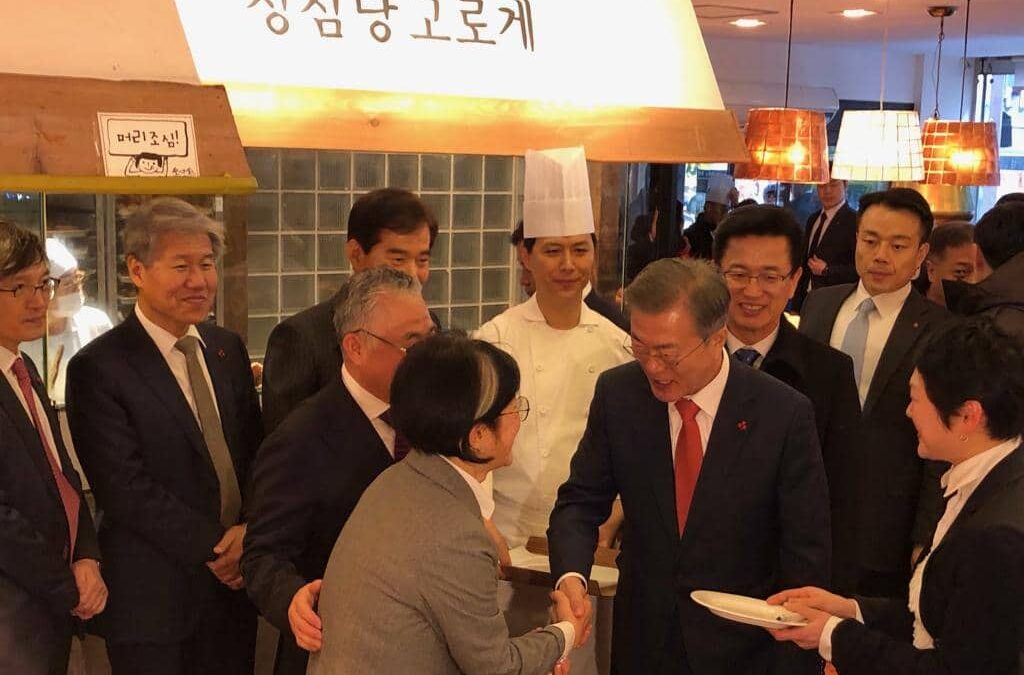
Jan 30, 2019 | Non categorizzato
On January 24 Korean President Moon Jae-in visited the Sum Sim Dang bakery, which is part of the Focolare’s Economy of Communion project. 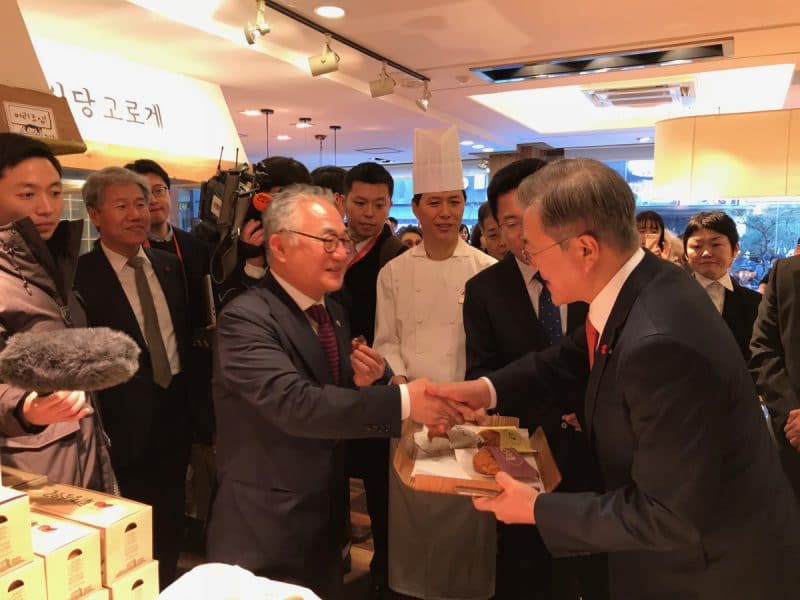
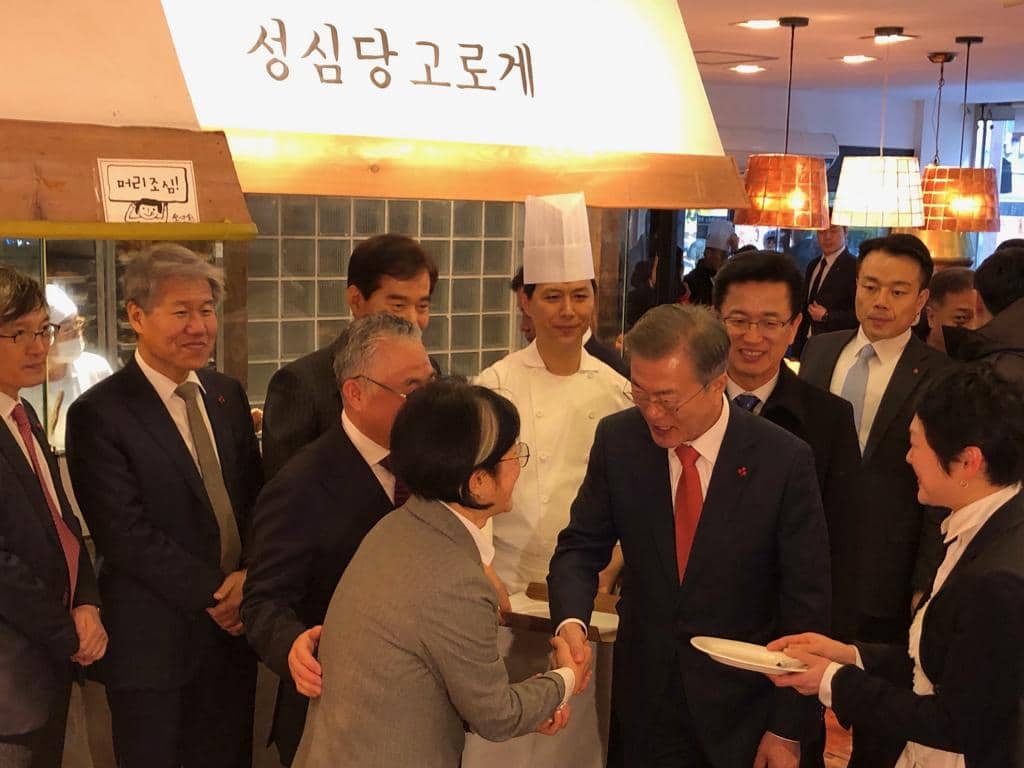 For a business owner, it goes without saying that having the president of the republic visit your business is an exceptional event. But if that visit happens on the president’s birthday, it’s even more so! That’s exactly what happened in Daejeon to Amata Kim and Fedes Im, two Korean entrepreneurs who are part of the Economy of Communion and run the well-known bakery Sung Sim Dang. Moon Jae-in, who has been South Korea’s president since May 2017, is known in the West for starting the peace process with North Korea after almost 70 years of cold war. He celebrated his birthday at Sung Sim Dang with a magnificent cake and was able to get to know the business’s history and reality up close. His Instagram post got more than 76,000 likes in just a few hours. “I was pleasantly surprised today to celebrate my birthday at the Sung Sim Dang bakery in Daejeon,” he said. “During the war in 1950 my father and the bakery’s founder (Fedes’ father) were on the same evacuation ship, Victoria, fleeing North Korea. Remembering this moment of history is for us is something we hold dear and precious. My birthday is a day like any other, but today I am recharged with new strength from the well wishes of so many. Thank you!” The event resonated widely in the media, partly because Sung Sim Dang is universally recognized and highly valued throughout the city of Daejeon. Click here to see video highlights from the visit.
For a business owner, it goes without saying that having the president of the republic visit your business is an exceptional event. But if that visit happens on the president’s birthday, it’s even more so! That’s exactly what happened in Daejeon to Amata Kim and Fedes Im, two Korean entrepreneurs who are part of the Economy of Communion and run the well-known bakery Sung Sim Dang. Moon Jae-in, who has been South Korea’s president since May 2017, is known in the West for starting the peace process with North Korea after almost 70 years of cold war. He celebrated his birthday at Sung Sim Dang with a magnificent cake and was able to get to know the business’s history and reality up close. His Instagram post got more than 76,000 likes in just a few hours. “I was pleasantly surprised today to celebrate my birthday at the Sung Sim Dang bakery in Daejeon,” he said. “During the war in 1950 my father and the bakery’s founder (Fedes’ father) were on the same evacuation ship, Victoria, fleeing North Korea. Remembering this moment of history is for us is something we hold dear and precious. My birthday is a day like any other, but today I am recharged with new strength from the well wishes of so many. Thank you!” The event resonated widely in the media, partly because Sung Sim Dang is universally recognized and highly valued throughout the city of Daejeon. Click here to see video highlights from the visit.
Antonella Ferrucci
Source: www.edc-online.org 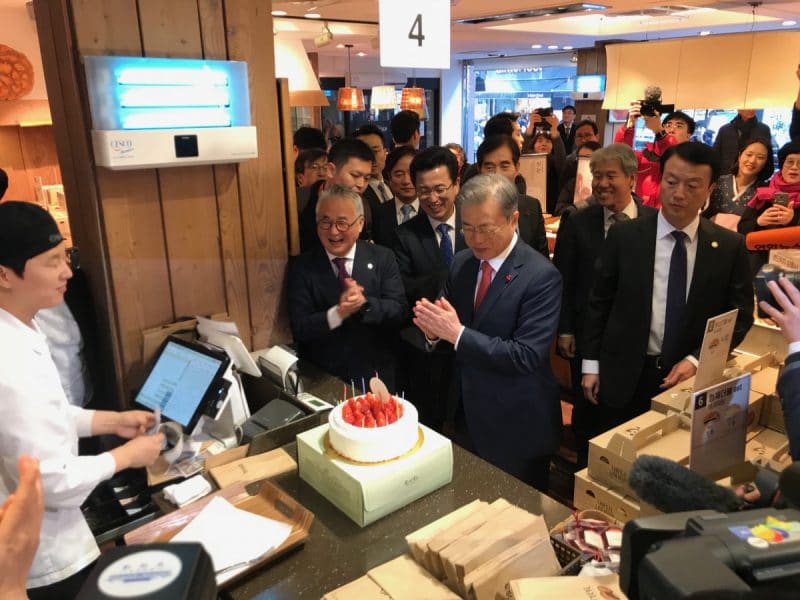
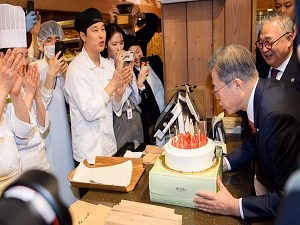
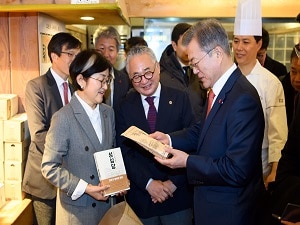

Jan 28, 2019 | Non categorizzato
Trieste, Italy – stories related by those who actually live them “Together with members of Caritas and the Italian Consortium of Solidarity (ICS), we support mainly migrant and refugee families and their children, hosted at a reception facility in our city, Trieste, and in the province. For the last three years, we have been organizing regular activities; some of us help mothers with their study of the Italian language to facilitate their everyday life; others play with children and follow them in their homework. Many families have been hosted in our centre, and with almost all them we have managed to build a relationship that lasts even after they leave the centre.  Through collaboration with Azione per Famiglie Nuove Onlus (New Families), we set up a project to support a Kurdish family who was in difficulty. This project was financed by some members of the community. After having been supported for two years, the father has now managed to find a job, so the family is self-supporting and lives in a hired apartment. Through other small projects we help other families in their various needs; mothers are assisted to follow specialization courses and thus be prepared for a job, and children are helped to integrate and participate in various activities, as for example sport. We see that these families get the medical care necessary and we also accompany them in their search for a home. We have found small jobs for mothers; and a father, whom we helped with driving lessons, is now employed with a company as a truck driver. With the help of some families, we have managed to offer a “family holiday” to an African widow and her two children, who really needed it. We also try to share with them particular moments in everyday life such as birthdays, Sunday outings to the park, boat-trips, New Year’s Eve festivities, Carnival celebrations and also moments of prayer, as for example during the Ramadam for our Muslim friends. After the appeal by Pope Francis on the World Day of the Poor: “This poor man cried, and the Lord heard him”, we wanted to answer his invitation to all Christians to hear this cry and not let it be in vain. So we thought of organizing a “Friendship Festival”, a lunch for those in need: refugees, migrants, unemployed and poor people of our city. We also managed to involve our Focolare community, and asked members to help with food and with other things needed for preparing the hall. We involved even the friends we invited, asking them to contribute towards our feast – if it were possible – with some typical food of their country of origin. About eighty people participated; they came from Cameroon, Nigeria, Eygpt, Tunisia, Russia, Pakistan, Kurdistan, Kosovo. To our great surprise, we are realizing that Caritas is starting to consider us as a point of reference, a “project” that goes well beyond welfare work. We are being called to share in their programmes and projects and sometimes even to seek solutions. It seems that they are pleased with the way we welcome and support those in need, while we aim at building relationships of reciprocity. In the midst of this chaos, where, maybe, not everyone looks at the welcome given to the least from the same valuable point of view, we feel that we cannot stop, but we must continue to give hope.
Through collaboration with Azione per Famiglie Nuove Onlus (New Families), we set up a project to support a Kurdish family who was in difficulty. This project was financed by some members of the community. After having been supported for two years, the father has now managed to find a job, so the family is self-supporting and lives in a hired apartment. Through other small projects we help other families in their various needs; mothers are assisted to follow specialization courses and thus be prepared for a job, and children are helped to integrate and participate in various activities, as for example sport. We see that these families get the medical care necessary and we also accompany them in their search for a home. We have found small jobs for mothers; and a father, whom we helped with driving lessons, is now employed with a company as a truck driver. With the help of some families, we have managed to offer a “family holiday” to an African widow and her two children, who really needed it. We also try to share with them particular moments in everyday life such as birthdays, Sunday outings to the park, boat-trips, New Year’s Eve festivities, Carnival celebrations and also moments of prayer, as for example during the Ramadam for our Muslim friends. After the appeal by Pope Francis on the World Day of the Poor: “This poor man cried, and the Lord heard him”, we wanted to answer his invitation to all Christians to hear this cry and not let it be in vain. So we thought of organizing a “Friendship Festival”, a lunch for those in need: refugees, migrants, unemployed and poor people of our city. We also managed to involve our Focolare community, and asked members to help with food and with other things needed for preparing the hall. We involved even the friends we invited, asking them to contribute towards our feast – if it were possible – with some typical food of their country of origin. About eighty people participated; they came from Cameroon, Nigeria, Eygpt, Tunisia, Russia, Pakistan, Kurdistan, Kosovo. To our great surprise, we are realizing that Caritas is starting to consider us as a point of reference, a “project” that goes well beyond welfare work. We are being called to share in their programmes and projects and sometimes even to seek solutions. It seems that they are pleased with the way we welcome and support those in need, while we aim at building relationships of reciprocity. In the midst of this chaos, where, maybe, not everyone looks at the welcome given to the least from the same valuable point of view, we feel that we cannot stop, but we must continue to give hope.
Paola Torelli Mosca On behalf of the Trieste welcome and support group to migrants
Fonte: www.focolaritalia.it
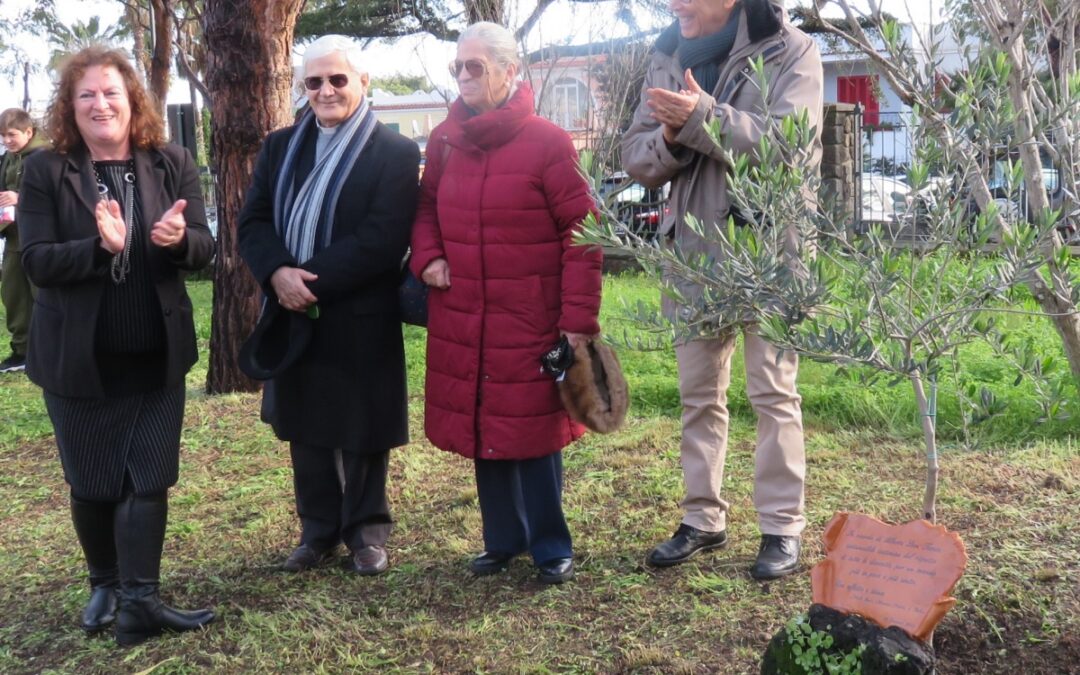
Jan 26, 2019 | Non categorizzato
An occasion to recall the story of Alberta Levin Temin, speak about the Shoah with secondary school students and propose that the Golden Rule is a way of creating a more united and peaceful world. 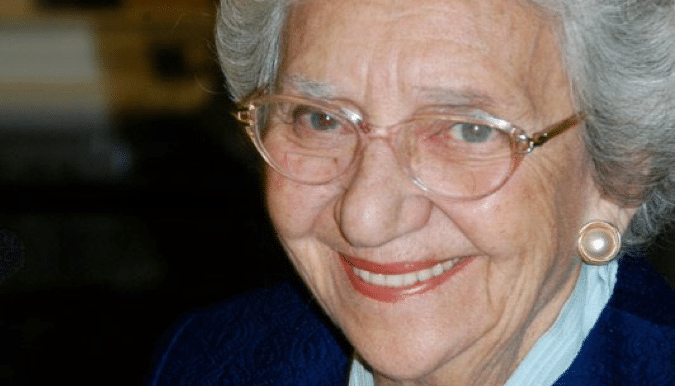 Splendid sunshine provided a background to a special day in Ischia, an island in the Bay of Naples in Italy, when on January 23, a group of students from Giovanni Scotti High School attended the presentation of a book entitled “I Will Speak for as Long as I Live”. At this event, they learnt about Alberta Levi Temin who was a direct witness to the tragedy of the Holocaust and an admirer of Chiara Lubich. The young people listened to an emotional account of her life story in the presence of a group of friends of the Focolare Movement including teachers, students, parents and even the author of the book Pasquale Lubrano Lavadera and Diana Pezza Borrelli. The latter had met Alberta through the “Association of Jewish–Christian Friends” in Naples and had enjoyed a warm relationship with her. Pasquale said, “One day, Alberta came to speak in my school. She was Jewish but she came with her dear friend, Diana, who was Catholic. She had been invited to speak to staff and students about the horrors of the Shoah but also to witness to the fact that dialogue is possible among people of different races, faiths and beliefs. I was very struck by one thing she said, ‘There is only one human family and we are all brothers and sisters.’”
Splendid sunshine provided a background to a special day in Ischia, an island in the Bay of Naples in Italy, when on January 23, a group of students from Giovanni Scotti High School attended the presentation of a book entitled “I Will Speak for as Long as I Live”. At this event, they learnt about Alberta Levi Temin who was a direct witness to the tragedy of the Holocaust and an admirer of Chiara Lubich. The young people listened to an emotional account of her life story in the presence of a group of friends of the Focolare Movement including teachers, students, parents and even the author of the book Pasquale Lubrano Lavadera and Diana Pezza Borrelli. The latter had met Alberta through the “Association of Jewish–Christian Friends” in Naples and had enjoyed a warm relationship with her. Pasquale said, “One day, Alberta came to speak in my school. She was Jewish but she came with her dear friend, Diana, who was Catholic. She had been invited to speak to staff and students about the horrors of the Shoah but also to witness to the fact that dialogue is possible among people of different races, faiths and beliefs. I was very struck by one thing she said, ‘There is only one human family and we are all brothers and sisters.’” 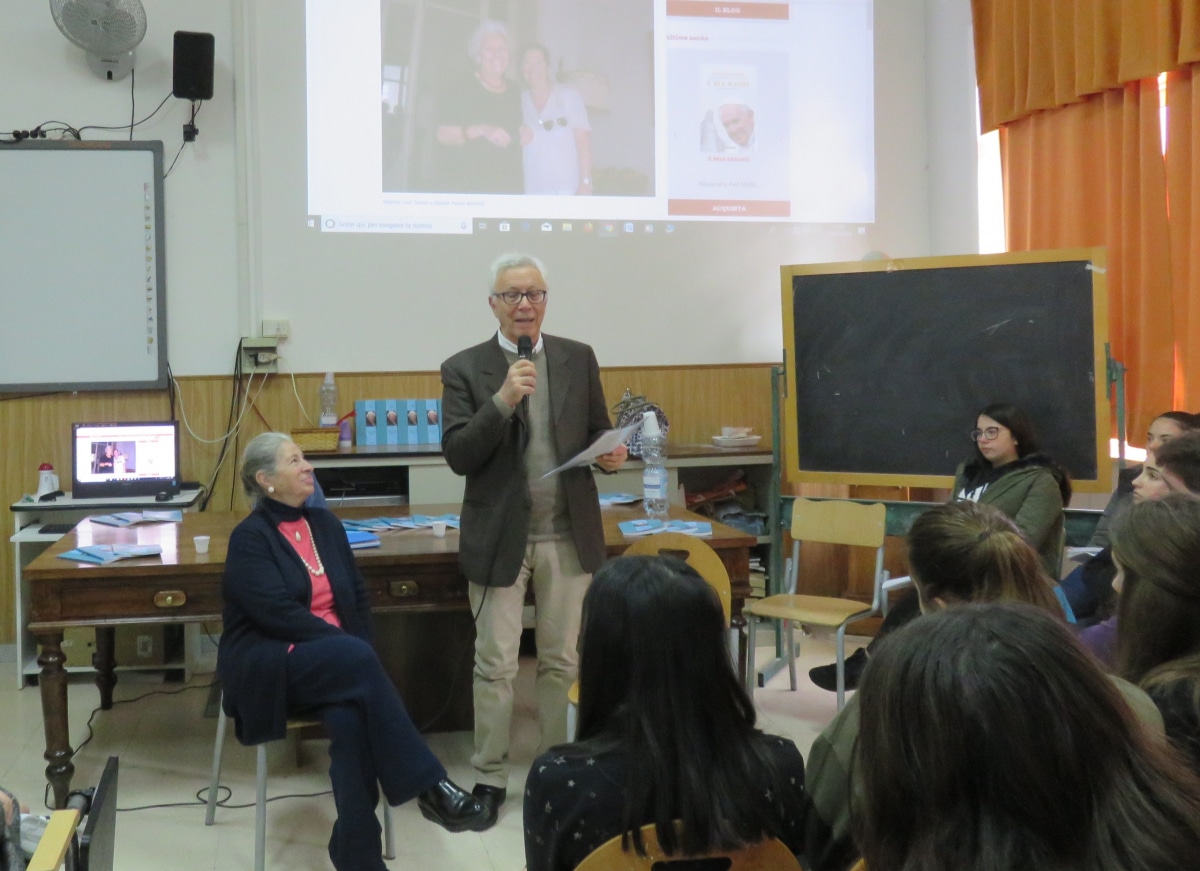 Alberta died in 2016 but throughout her life, she was sustained by one idea. It was the Golden Rule “Do to others what you would like done to you and do not do to others what you would not want done to you.” This idea always filled her with joy. She was committed to creating dialogue at all levels of society. She said, “I understand that today, more than ever, we need to love: as Chiara Lubich says, ‘We need to love another person’s country as much as we love our own.’ We should love the whole of humanity: it is only in this context that dialogue can develop.” “Every school should dedicate an hour or two each week to teaching all classes about the value of relationship. This helps young people to live together in a peaceful way and to collaborate in their studies for the good of all. Their school years are their first experience of being part of society and they should aim at making this a time of mutual support.” Alberta was convinced of this.
Alberta died in 2016 but throughout her life, she was sustained by one idea. It was the Golden Rule “Do to others what you would like done to you and do not do to others what you would not want done to you.” This idea always filled her with joy. She was committed to creating dialogue at all levels of society. She said, “I understand that today, more than ever, we need to love: as Chiara Lubich says, ‘We need to love another person’s country as much as we love our own.’ We should love the whole of humanity: it is only in this context that dialogue can develop.” “Every school should dedicate an hour or two each week to teaching all classes about the value of relationship. This helps young people to live together in a peaceful way and to collaborate in their studies for the good of all. Their school years are their first experience of being part of society and they should aim at making this a time of mutual support.” Alberta was convinced of this. 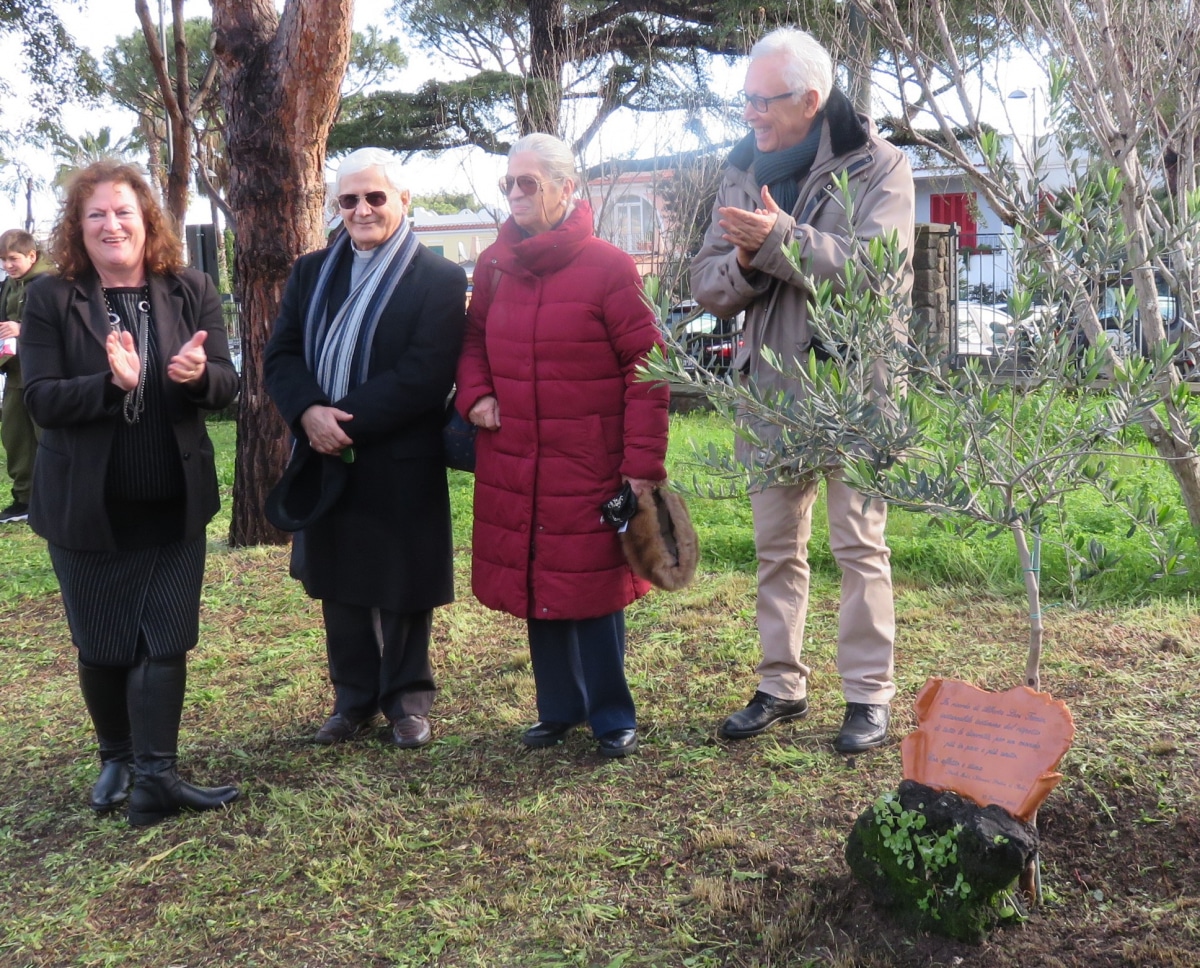 At the conclusion of the presentation, the young people were invited to live the Golden Rule – “do to other whatever you would like done to you” – an instrument of peace and dialogue shared by all religions. To mark the occasion, the director of education, Lucia Monti, put a plaque by the olive tree dedicated to Alberta to express gratitude towards her and to encourage people to remember her example. Chiara, a student from the school, also said, “Thank you for the message of fraternity that you have given us. I am so impressed by the fact that Catholics are meeting with Jews and people of other religions to contribute to building a united world.” Pasquale Lubrano said, “I feel that I should thank Alberta for her life and wisdom. Now that she is no longer among us, I hope that by reading her story, each person here can experience her unique interior “beauty” and share this with others.” He concluded by saying, “Today I have been deeply moved by the attentive way in which the young people have listened, by their enthusiasm and by their searching gaze. In each one of them I have seen the need to live Love for all human beings and the awareness that the human family is one.”
At the conclusion of the presentation, the young people were invited to live the Golden Rule – “do to other whatever you would like done to you” – an instrument of peace and dialogue shared by all religions. To mark the occasion, the director of education, Lucia Monti, put a plaque by the olive tree dedicated to Alberta to express gratitude towards her and to encourage people to remember her example. Chiara, a student from the school, also said, “Thank you for the message of fraternity that you have given us. I am so impressed by the fact that Catholics are meeting with Jews and people of other religions to contribute to building a united world.” Pasquale Lubrano said, “I feel that I should thank Alberta for her life and wisdom. Now that she is no longer among us, I hope that by reading her story, each person here can experience her unique interior “beauty” and share this with others.” He concluded by saying, “Today I have been deeply moved by the attentive way in which the young people have listened, by their enthusiasm and by their searching gaze. In each one of them I have seen the need to live Love for all human beings and the awareness that the human family is one.”
Lorenzo Russo
Jan 25, 2019 | Non categorizzato
The 34th World Youth Day organized by the Catholic Church is underway in Panama. We turn to Panamanian journalist and Focolare member, Flor Ortega, for her firsthand comments. The bridges logo of the 2019 WYD – with the main theme “I am the servant of the Lord. May it be done to me according to your word” (Lk 1:38) – represents both the Isthmus of Panama and the spirit of welcome. A small strip of land, measuring just 75 square meters, between the Atlantic and Pacific oceans, Panama links not only the two Americas, but also all continents, through its famous canal frequented by world shipping. It is a welcoming, open-door country, particularly for the many migrants who are, and have ever been, moving South or North. How have you been preparing for this event? “Back in 2016, on 31 July at the ‘Campus Misericordiae’ in Kraków, Poland, Pope Francis announced that the 34th World Youth Day in 2019 would be in Panama. The Focolare Movement in the central American region greeted the news with great enthusiasm,” recalls Panamanian journalist Flor Ortega. “It took a while for updates to get through. We set up commissions to be able to transmit information on the preparation in all its aspects quickly and effectively. Now the WYD has a strong media and social media presence”. On 17 May, in Panama City, during a Eucharistic celebration with thousands of people, Archbishop José Domingo Ulloa launched the idea of a series of Prayer Days on the 22nd of every month leading up to the WYD. The Archbishop then personally asked the youth of the Focolare Movement to prepare the first such day, on 22 June. How did the young people react to this proposal? “With real enthusiasm and commitment. Carmen Cecilia from Panama, told us how this commitment actually helped her to a new understanding of prayer, of the Eucharist and of the Rosary ‘as opportunities to meet Jesus face to face’.” Many young people, members of the Focolare Movement in Panama and other countries, have been working for months on a two-day event at the end of the WYD, 29-31 January, for around 400 youth. “Adults have been offering their support by organizing the meals and accommodation, as well as fund-raising. The young people have been concentrating on creating the online registration system, setting up a consultation service and ‘call center’ connecting people wishing to contribute from outside Panama. The women’s Focolare centre in Panama has become something of a logistics coordination point. Keilyn from Costa Rica described it as ‘as opportunity to get to know the community of Panama which is very united and hard-working, a real example to us all’.” Among those arriving from around the world, Jesús Morán, Focolare Vice President, from the Movement’s international centre in Rome, Italy. And the international Focolare band, Gen Verde travelled from Italy to perform in two pre-WYD events. The first was in Chitré, provincial capital of Herrera, on the Gulf of Panama, the second in Colón on the Atlantic coast. Gen Verde will be performing again on 26 January at the vigil leading up to the concluding Mass to be celebrated by Pope Francis. “Pro mundi beneficio”, “For the Benefit of the World” proclaims Panama’s national motto. What does it mean? «The motto, historically, is linked to the service provided by the canal. But now, ideally, we’d like to extend it to the message that will come out of this World Youth Day!»
Chiara Favotti

Jan 24, 2019 | Non categorizzato
The trip was promoted by the Patriarch Athenagoras-Chiara Lubich International Ecumenical Chair, which was established after Patriarch Bartholomew received an honorary doctorate in 2015. “Continue on the path you’ve taken on the way of dialogue, because it is reconciliation, true encounter, the ability to understand, divine philanthropy, welcoming others who are different, transfiguring the world, and welcoming God into human history. Bring this message to all those at all levels who participate in the work of your institute, with a fraternal embrace to Focolare Movement President Maria Voce, and all our brothers and sisters in the movement. The ecumenical patriarchate is your home as well, this city of Constantine is your city as well, because you are not foreigners, but friends.” This was the final greeting that Ecumenical Patriarch of Constantinople Bartholomew I gave to 30 professors and students of the Sophia University Institute (Loppiano), who are from a number of countries. Together with the institute’s director, Mons. Piero Coda, they had traveled to the patriarch’s residence at Phanar (Istanbul, Turkey).  The visit of the Sophia delegation to the ecumenical patriarchate was from January 8–12. It was promoted by the Patriarch Athenagoras-Chiara Lubich International Ecumenical Chair, which had been established after Patriarch Bartholomew received an honorary doctorate on October 26, 2015. It was established “to remember and restart the prophetic spirit that animated the extraordinary harmony of heart and mind between Patriarch Athenagoras I and Chiara Lubich, just before the Second Vatican Council and the historical meeting between the patriarch and Pope Paul VI.” The academic trip included, among other things, together with the audience with the patriarch, a meeting with Metropolitan Gennadios Zervos, who was in Istabul during that time for the Holy Synod. The group also met with Metropolitan Elpidophoros of Bursa on January 10, at the Monastery of the Holy Trinity on the island of Halki, Turkey. This meeting opened up productive possibilities of cooperation between the seminary and Sophia University Institute, including a summer school that will probably be held in late spring 2020. The visit was particularly significant in this fragile, tense moment that the Orthodox world is going through today. It is aiming once again to call for a commitment to tenaciously pursue a path of mutual understanding, and a reciprocal exchange of gifts to promote fraternity and communion.
The visit of the Sophia delegation to the ecumenical patriarchate was from January 8–12. It was promoted by the Patriarch Athenagoras-Chiara Lubich International Ecumenical Chair, which had been established after Patriarch Bartholomew received an honorary doctorate on October 26, 2015. It was established “to remember and restart the prophetic spirit that animated the extraordinary harmony of heart and mind between Patriarch Athenagoras I and Chiara Lubich, just before the Second Vatican Council and the historical meeting between the patriarch and Pope Paul VI.” The academic trip included, among other things, together with the audience with the patriarch, a meeting with Metropolitan Gennadios Zervos, who was in Istabul during that time for the Holy Synod. The group also met with Metropolitan Elpidophoros of Bursa on January 10, at the Monastery of the Holy Trinity on the island of Halki, Turkey. This meeting opened up productive possibilities of cooperation between the seminary and Sophia University Institute, including a summer school that will probably be held in late spring 2020. The visit was particularly significant in this fragile, tense moment that the Orthodox world is going through today. It is aiming once again to call for a commitment to tenaciously pursue a path of mutual understanding, and a reciprocal exchange of gifts to promote fraternity and communion.


 For the last six years activities have been programmed and carried out in the fields of health care, education and family income support; recently other programmes have been added, especially in the field of vocational training and education. “This commitment emerges not only from wanting to meet the urgent material needs of the people supported, but also from wanting to offer work opportunities to many others, especially to young people, who would otherwise be unemployed because of the country’s current situation”. Last year, in Dueilaa, there were more than 90 children who attended after school activities and this gave excellent results. The centre remained open even during the summer months and it could cater for an intake of 115 children. “Some mothers tell us that their children opt to come to the centre even when they are sick or when there is some other family programme”. “A Generation of hope” is the name of another centre located at Homs.The students who attend this centre have successfully passed their school exams. Here, the possibility of psychological support is also offered to both children and parents. “We target mainly the traumas suffered because of war, and this helps to restore confidence and to find solutions for their many problems”. Just over two years ago, at this same place, and also at Kafarbo, a health care project has been set up. More than a hundred people, who needed special medical care, have already benefitted from this project. “We try to collaborate with other organizations to be able to help the patients even when the cost of treatment or surgery exceeds our means”.
For the last six years activities have been programmed and carried out in the fields of health care, education and family income support; recently other programmes have been added, especially in the field of vocational training and education. “This commitment emerges not only from wanting to meet the urgent material needs of the people supported, but also from wanting to offer work opportunities to many others, especially to young people, who would otherwise be unemployed because of the country’s current situation”. Last year, in Dueilaa, there were more than 90 children who attended after school activities and this gave excellent results. The centre remained open even during the summer months and it could cater for an intake of 115 children. “Some mothers tell us that their children opt to come to the centre even when they are sick or when there is some other family programme”. “A Generation of hope” is the name of another centre located at Homs.The students who attend this centre have successfully passed their school exams. Here, the possibility of psychological support is also offered to both children and parents. “We target mainly the traumas suffered because of war, and this helps to restore confidence and to find solutions for their many problems”. Just over two years ago, at this same place, and also at Kafarbo, a health care project has been set up. More than a hundred people, who needed special medical care, have already benefitted from this project. “We try to collaborate with other organizations to be able to help the patients even when the cost of treatment or surgery exceeds our means”. 

 They are young people, adults and families, who set off in small groups to visit distant countries where communities and villages await them. For a while they travel along the same road together, experiencing mutual acceptance and an exchange between the different cultures. They give of themselves to the others and they “make themselves one” with the others – in their joys and in their sorrows. They are certain that it is through loving our neighbours that each one of us finds our own full realisation. They believe that fraternity is possible between people of different faiths and beliefs and that the Golden Rule – “Do to others what you would have done to you” – exists for everyone to make it their own. These small groups are the so-called “temporary focolares”, a travelling version of the traditional focolares. They function as central points of the Movement in various territories. They are like beating hearts sharing the life within them. In recent years there have been dozens of them, all following in the wake of the “pioneers” of the Focolare Movement who, ever since the 1950s, were sent out by Chiara Lubich like modern apostles to bring the charism of unity to different continents.
They are young people, adults and families, who set off in small groups to visit distant countries where communities and villages await them. For a while they travel along the same road together, experiencing mutual acceptance and an exchange between the different cultures. They give of themselves to the others and they “make themselves one” with the others – in their joys and in their sorrows. They are certain that it is through loving our neighbours that each one of us finds our own full realisation. They believe that fraternity is possible between people of different faiths and beliefs and that the Golden Rule – “Do to others what you would have done to you” – exists for everyone to make it their own. These small groups are the so-called “temporary focolares”, a travelling version of the traditional focolares. They function as central points of the Movement in various territories. They are like beating hearts sharing the life within them. In recent years there have been dozens of them, all following in the wake of the “pioneers” of the Focolare Movement who, ever since the 1950s, were sent out by Chiara Lubich like modern apostles to bring the charism of unity to different continents.  Nepal is a meeting point between the Mongolian populations of Asia and the Caucasian populations of the Indian plains. There is a profound sense of spirituality there with Buddhism practised side by side with Christianity and Hinduism. In 2018, from October 20 to November 7, a group of focolarini made their way to Nepal, travelling from the capital Kathmandu to Dharan, in the south, and then further north to Pokhara. Their goal was to build relationships. Coming from India, Italy and Great Britain, the members of the focolare group immediately immersed themselves in the Nepalese culture. On their arrival the Dashain Hindu festival was in progress. It’s the largest Hindu festival and it involves the whole country. The group participated in the Tika ritual, and received the traditional blessing. In Daharan, the group was welcomed in parishes where they spoke of the history of the Focolare Movement and of its commitment to universal fraternity. They were met with great enthusiasm from the people and the priests. In the capital, the group was joined by two Nepalese young people who had participated in the 2018 Genfest in Manila. They shared their experience with the students of a school run by Jesuit fathers. In Pokhara they met with some Hindu families. Although they were poor and had very little to live on, harmony and dignity filled their homes. After the focolarini spoke about the ideal of unity, they were invited to have lunch together while listening to traditional music.
Nepal is a meeting point between the Mongolian populations of Asia and the Caucasian populations of the Indian plains. There is a profound sense of spirituality there with Buddhism practised side by side with Christianity and Hinduism. In 2018, from October 20 to November 7, a group of focolarini made their way to Nepal, travelling from the capital Kathmandu to Dharan, in the south, and then further north to Pokhara. Their goal was to build relationships. Coming from India, Italy and Great Britain, the members of the focolare group immediately immersed themselves in the Nepalese culture. On their arrival the Dashain Hindu festival was in progress. It’s the largest Hindu festival and it involves the whole country. The group participated in the Tika ritual, and received the traditional blessing. In Daharan, the group was welcomed in parishes where they spoke of the history of the Focolare Movement and of its commitment to universal fraternity. They were met with great enthusiasm from the people and the priests. In the capital, the group was joined by two Nepalese young people who had participated in the 2018 Genfest in Manila. They shared their experience with the students of a school run by Jesuit fathers. In Pokhara they met with some Hindu families. Although they were poor and had very little to live on, harmony and dignity filled their homes. After the focolarini spoke about the ideal of unity, they were invited to have lunch together while listening to traditional music. 

 For a business owner, it goes without saying that having the president of the republic visit your business is an exceptional event. But if that visit happens on the president’s birthday, it’s even more so! That’s exactly what happened in Daejeon to Amata Kim and Fedes Im, two Korean entrepreneurs who are part of the Economy of Communion and run the well-known bakery Sung Sim Dang. Moon Jae-in, who has been South Korea’s president since May 2017, is known in the West for starting the peace process with North Korea after almost 70 years of cold war. He celebrated his birthday at Sung Sim Dang with a magnificent cake and was able to get to know the business’s history and reality up close. His Instagram post got more than 76,000 likes in just a few hours. “I was pleasantly surprised today to celebrate my birthday at the Sung Sim Dang bakery in Daejeon,” he said. “During the war in 1950 my father and the bakery’s founder (Fedes’ father) were on the same evacuation ship, Victoria, fleeing North Korea. Remembering this moment of history is for us is something we hold dear and precious. My birthday is a day like any other, but today I am recharged with new strength from the well wishes of so many. Thank you!” The event resonated widely in the media, partly because Sung Sim Dang is universally recognized and highly valued throughout the city of Daejeon.
For a business owner, it goes without saying that having the president of the republic visit your business is an exceptional event. But if that visit happens on the president’s birthday, it’s even more so! That’s exactly what happened in Daejeon to Amata Kim and Fedes Im, two Korean entrepreneurs who are part of the Economy of Communion and run the well-known bakery Sung Sim Dang. Moon Jae-in, who has been South Korea’s president since May 2017, is known in the West for starting the peace process with North Korea after almost 70 years of cold war. He celebrated his birthday at Sung Sim Dang with a magnificent cake and was able to get to know the business’s history and reality up close. His Instagram post got more than 76,000 likes in just a few hours. “I was pleasantly surprised today to celebrate my birthday at the Sung Sim Dang bakery in Daejeon,” he said. “During the war in 1950 my father and the bakery’s founder (Fedes’ father) were on the same evacuation ship, Victoria, fleeing North Korea. Remembering this moment of history is for us is something we hold dear and precious. My birthday is a day like any other, but today I am recharged with new strength from the well wishes of so many. Thank you!” The event resonated widely in the media, partly because Sung Sim Dang is universally recognized and highly valued throughout the city of Daejeon. 




 Splendid sunshine provided a background to a special day in Ischia, an island in the Bay of Naples in Italy, when on January 23, a group of students from Giovanni Scotti High School attended the presentation of a book entitled “I Will Speak for as Long as I Live”. At this event, they learnt about Alberta Levi Temin who was a direct witness to the tragedy of the Holocaust and an admirer of Chiara Lubich. The young people listened to an emotional account of her life story in the presence of a group of friends of the Focolare Movement including teachers, students, parents and even the author of the book Pasquale Lubrano Lavadera and Diana Pezza Borrelli. The latter had met Alberta through the “Association of Jewish–Christian Friends” in Naples and had enjoyed a warm relationship with her. Pasquale said, “One day, Alberta came to speak in my school. She was Jewish but she came with her dear friend, Diana, who was Catholic. She had been invited to speak to staff and students about the horrors of the Shoah but also to witness to the fact that dialogue is possible among people of different races, faiths and beliefs. I was very struck by one thing she said, ‘There is only one human family and we are all brothers and sisters.’”
Splendid sunshine provided a background to a special day in Ischia, an island in the Bay of Naples in Italy, when on January 23, a group of students from Giovanni Scotti High School attended the presentation of a book entitled “I Will Speak for as Long as I Live”. At this event, they learnt about Alberta Levi Temin who was a direct witness to the tragedy of the Holocaust and an admirer of Chiara Lubich. The young people listened to an emotional account of her life story in the presence of a group of friends of the Focolare Movement including teachers, students, parents and even the author of the book Pasquale Lubrano Lavadera and Diana Pezza Borrelli. The latter had met Alberta through the “Association of Jewish–Christian Friends” in Naples and had enjoyed a warm relationship with her. Pasquale said, “One day, Alberta came to speak in my school. She was Jewish but she came with her dear friend, Diana, who was Catholic. She had been invited to speak to staff and students about the horrors of the Shoah but also to witness to the fact that dialogue is possible among people of different races, faiths and beliefs. I was very struck by one thing she said, ‘There is only one human family and we are all brothers and sisters.’”  Alberta died in 2016 but throughout her life, she was sustained by one idea. It was the Golden Rule “Do to others what you would like done to you and do not do to others what you would not want done to you.” This idea always filled her with joy. She was committed to creating dialogue at all levels of society. She said, “I understand that today, more than ever, we need to love: as Chiara Lubich says, ‘We need to love another person’s country as much as we love our own.’ We should love the whole of humanity: it is only in this context that dialogue can develop.” “Every school should dedicate an hour or two each week to teaching all classes about the value of relationship. This helps young people to live together in a peaceful way and to collaborate in their studies for the good of all. Their school years are their first experience of being part of society and they should aim at making this a time of mutual support.” Alberta was convinced of this.
Alberta died in 2016 but throughout her life, she was sustained by one idea. It was the Golden Rule “Do to others what you would like done to you and do not do to others what you would not want done to you.” This idea always filled her with joy. She was committed to creating dialogue at all levels of society. She said, “I understand that today, more than ever, we need to love: as Chiara Lubich says, ‘We need to love another person’s country as much as we love our own.’ We should love the whole of humanity: it is only in this context that dialogue can develop.” “Every school should dedicate an hour or two each week to teaching all classes about the value of relationship. This helps young people to live together in a peaceful way and to collaborate in their studies for the good of all. Their school years are their first experience of being part of society and they should aim at making this a time of mutual support.” Alberta was convinced of this.  At the conclusion of the presentation, the young people were invited to live the Golden Rule – “do to other whatever you would like done to you” – an instrument of peace and dialogue shared by all religions. To mark the occasion, the director of education, Lucia Monti, put a plaque by the olive tree dedicated to Alberta to express gratitude towards her and to encourage people to remember her example. Chiara, a student from the school, also said, “Thank you for the message of fraternity that you have given us. I am so impressed by the fact that Catholics are meeting with Jews and people of other religions to contribute to building a united world.” Pasquale Lubrano said, “I feel that I should thank Alberta for her life and wisdom. Now that she is no longer among us, I hope that by reading her story, each person here can experience her unique interior “beauty” and share this with others.” He concluded by saying, “Today I have been deeply moved by the attentive way in which the young people have listened, by their enthusiasm and by their searching gaze. In each one of them I have seen the need to live Love for all human beings and the awareness that the human family is one.”
At the conclusion of the presentation, the young people were invited to live the Golden Rule – “do to other whatever you would like done to you” – an instrument of peace and dialogue shared by all religions. To mark the occasion, the director of education, Lucia Monti, put a plaque by the olive tree dedicated to Alberta to express gratitude towards her and to encourage people to remember her example. Chiara, a student from the school, also said, “Thank you for the message of fraternity that you have given us. I am so impressed by the fact that Catholics are meeting with Jews and people of other religions to contribute to building a united world.” Pasquale Lubrano said, “I feel that I should thank Alberta for her life and wisdom. Now that she is no longer among us, I hope that by reading her story, each person here can experience her unique interior “beauty” and share this with others.” He concluded by saying, “Today I have been deeply moved by the attentive way in which the young people have listened, by their enthusiasm and by their searching gaze. In each one of them I have seen the need to live Love for all human beings and the awareness that the human family is one.” 